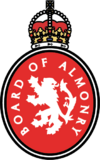Public Alms (Great Nortend)
 | |
 Almonry House | |
| Public social programme overview | |
|---|---|
| Formed | 1920 |
| Jurisdiction | Great Nortend |
| Headquarters | Almonry House, Lendert-with-Cadell, Great Nortend |
| Public social programme executive |
|
| Parent department | Board of Almonry |
The Public Alms Service is the state benefit programme in Great Nortend. It provides a number of welfare benefits for Erbonian subjects including housing, pensions, poor relief, legal alms and medical alms. The scheme is administered by the Lord High Almoner and the Board of Almonry. The modern Public Alms are authorised under the Lord High Almoner's Act 18 Edm. IX p. 44 passed in 1920 which created the Board of Almonry, headed by the Lord High Almoner. The Service does not include other state services, such as public schooling, police services or fire services, which are provided under separate arrangements.
Types of Benefits
The Lord High Almoner currently provides sixteen specific benefits across three principal categories. These are:—
Common Alms
- Old-age pension
- Widows' pension
- Invalidity pension
- Orphans' pension
Poor Alms
- Housing alms
- Sick alms
- Unemployment alms
- Legal alms
- Winter alms
Medical Alms
- Consultation subsidy
- Treatment subsidy
- Surgery subsidy
- Hospital subsidy
- Nursing subsidy
- Medicament subsidy
- Appliance subsidy
The Lord High Almoner may also grant Especial Alms for those in special circumstances not covered by the regulation benefits.
Funding

Public Alms are funded by subscriptions and taxation revenue. Every person employed by another in a master-servant employment relationship is required to register as a Subscriber to the Service. Self-employed workers may also voluntarily subscribe. Subscriptions are paid in the form of stamps, purchased at a Post Office. These are pasted every week or fortnight on a card which is posted to the Board of Almonry every six months. The responsibility is placed on the master to purchase and paste stamps, who is entitled to recover a proportion thereof from the servant's pay.
The weekly rate of Public Alms subscriptions is based upon the salary or average wage of the Subscriber, as well as living circumstances. The subscription for a married man with under the age of 21 is one and a half times that of a childless bachelor. Subscribers with more than two children incur increased subscriptions.
Eligibility
Generally, only subjects are eligible to apply for alms.
Common Alms
Persons generally become eligible to apply for Common Alms based upon their years of contributions to the fund of the Public Alms Service.
A person will be eligible to apply for Full Alms if he has contributed to the fund for over thirty years. A person is eligible to apply for Three-Quarter Alms if he has contributed for over twenty years. A person is eligible to apply for Half Alms if he has contributed for over ten years. A person is eligible to apply for Quarter Alms if he has contributed for at least one year. For those persons who by reason of invalidity are unable to contribute sufficiently to the Public Alms Service, a deemed number of years for contribution is calculated based upon the degree of invalidity, age, living circumstances and means.
In the case of the death of the subscriber, eligibility is calculated on the basis of the deceased husband or father's constributions. Payments made before conviction of a felony are forfeited as part of general forfeiture rules.
Medical Alms
All subjects are prima facie entitled to apply for medical and poor alms. The level of coverage depends on the patient's level of entitlement for Common Alms. The base coverage is at 50 per cent; however, coverage can go up to 100 per cent for those eligible for Full Alms.
Tests
Though subscribers may be entitled to apply for alms, they may not receive it if they do not meet any relevant tests. Importantly, Poor Alms are means tested given their purpose of helping the indigent poor. More specifically, each category of alms has its own specific requirements for eligibility. For example, unemployment alms require the recipient to have been let go involuntarily from employment and to demonstrate active searching for work. Medical alms require the patient to have a genuine medical need. The various tests are listed in the Lord High Almoner's Rules published annually.
This page is written in Erbonian English, which has its own spelling conventions (colour, travelled, centre, realise, instal, sobre, shew, artefact), and some terms that are used in it may be different or absent from other varieties of English. |
